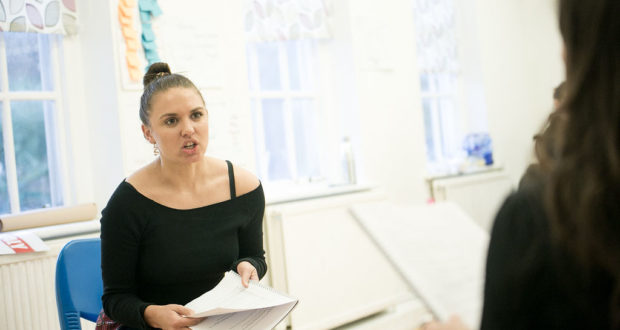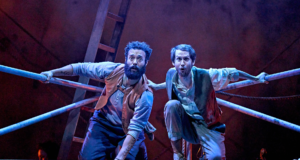The #MeToo movement has made a huge impact in the past year across various industries – and now, it’s coming to the London stage. Liv Warden’s new play Anomaly explores the lives of three daughters in the aftermath of their media mogul father’s arrest for assaulting his wife. Ahead of the show’s January run at the Old Red Lion Theatre, Warden discusses the importance of centring female voices and whether women can be complicit in men’s harassment in this guest blog.
‘Why haven’t you written the play about three sons, not three daughters?’
– One lady on a Facebook post I recently sent out promoting the play.
It’s very hard not to immediately bite back ‘BECAUSE I JUST DID OKAY? ENJOY THE SHOW.’ But it’s a valid question.
Anomaly tells the story of three women who are dealing with the direct consequences of their father’s actions. Would the play work with three sons? Yes. Would the play work with three sons dealing with the direct consequences of their mother’s actions? Maybe. But that’s not the play I’ve written. I’ve written about women.
Media sensationalism is a huge part of Anomaly, and it’s not the stories of sons being splashed across the media every other day.
My antagonist, who we never meet in the play, is the charismatic and powerful film producer Phillip Preston. We see his three daughters through a fisheye lens throughout the piece, dealing with the people in their lives who are demanding answers after their family starts to implode. In this man, I have created a figure of power and influence who we never see face up to his actions.
Soon after Harvey Weinstein was arrested for rape, sexual abuse and sexual misconduct, a right-wing artist only known as “Sabo” released his latest artwork. The piece was a photo of Meryl Streep, sat smiling next to Weinstein with a red bar plastered across her eyes. ‘She knew.’, it read. The posters, based on artwork by Barbra Kruger, were placed very meticulously around Hollywood. One was placed opposite the studio lot of 20th Century Fox, where her latest movie The Post was in production. One was near her family home.
Sabo, who has been called an “alt-right” version of Banksy, suggested Streep was aware of Weinstein alleged sexual abuse towards women over the years. ‘I wasn’t sitting in a room with her,’ he said. ‘I can’t say 100%. But I’d say anyone in the (film) industry had a pretty good idea. I think she knew.’
This is where Anomaly started. Much like the women in my play, Streep, even having been associated with the accused, is automatically assumed to be complicit.
It’s an argument that many of my friends have discussed with me. ‘Oh come on, of course they all knew. How could you not say anything? His wife, his employees, they all must have known!’ Well, yes, they probably did.
An anonymous former employee of Weinstein’s said in an article for the Guardian, ‘If you raised [Weinstein’s harassment], you were laughed off as naive. There was this underlying feeling that maybe you just weren’t good enough to impress him.’ Another former employee, Mark Lipsky, remembered someone senior running into the office, ‘red and sweating’. ‘”Someone call the police, Harvey just attacked me,”’ Lipsky told the Guardian, recounting, ‘He said Harvey attacked him on the street in front of the office. That was probably his last day. I don’t think anyone called the police.’ The Black Cube admitted to gathering information on the ‘attack list’ – 91 people Weinstein thought would talk to the media about his behaviour.
Putting myself in the shoes of these people, there’s no way I would have easily come out and given information. Their careers were at stake, as was their safety and those of their families.
With such a timely subject, I am aware that I have a responsibility with this piece. It is not a story that is retrospective, it is happening now. It feels visceral, political and raw.
It was recently pointed out to me that everything I thought was political about Anomaly was perhaps more social. If I look up examples of social matters, I find abortion, gay rights, religious freedom, which abuse of power seems to fall under. But as politicians have begun to use social issues as leverage, the lines have begun to blur. If you remove anything social from the political umbrella, politics becomes a paperwork activity about taxation. Politics is bigger than that, and we rely on our politicians to bring about social change and correct social abuses and injustices. So, yes, Anomaly is political.
I wrote this play to provide a different angle to a story than people expect to hear. My characters aren’t hysterical or hopeless, but they’re providing another female narrative concerning a huge issue of our times. In Anomaly we see three women navigating through a minefield of difficult situations for the sake of their family, their reputations and each other. Sometimes, it feels as though daring to tell a woman’s story is a political act in itself.
Anomaly will play at Old Red Lion Theatre from 8 January – 2 February.
 Everything Theatre Reviews, interviews and news for theatre lovers, London and beyond
Everything Theatre Reviews, interviews and news for theatre lovers, London and beyond



